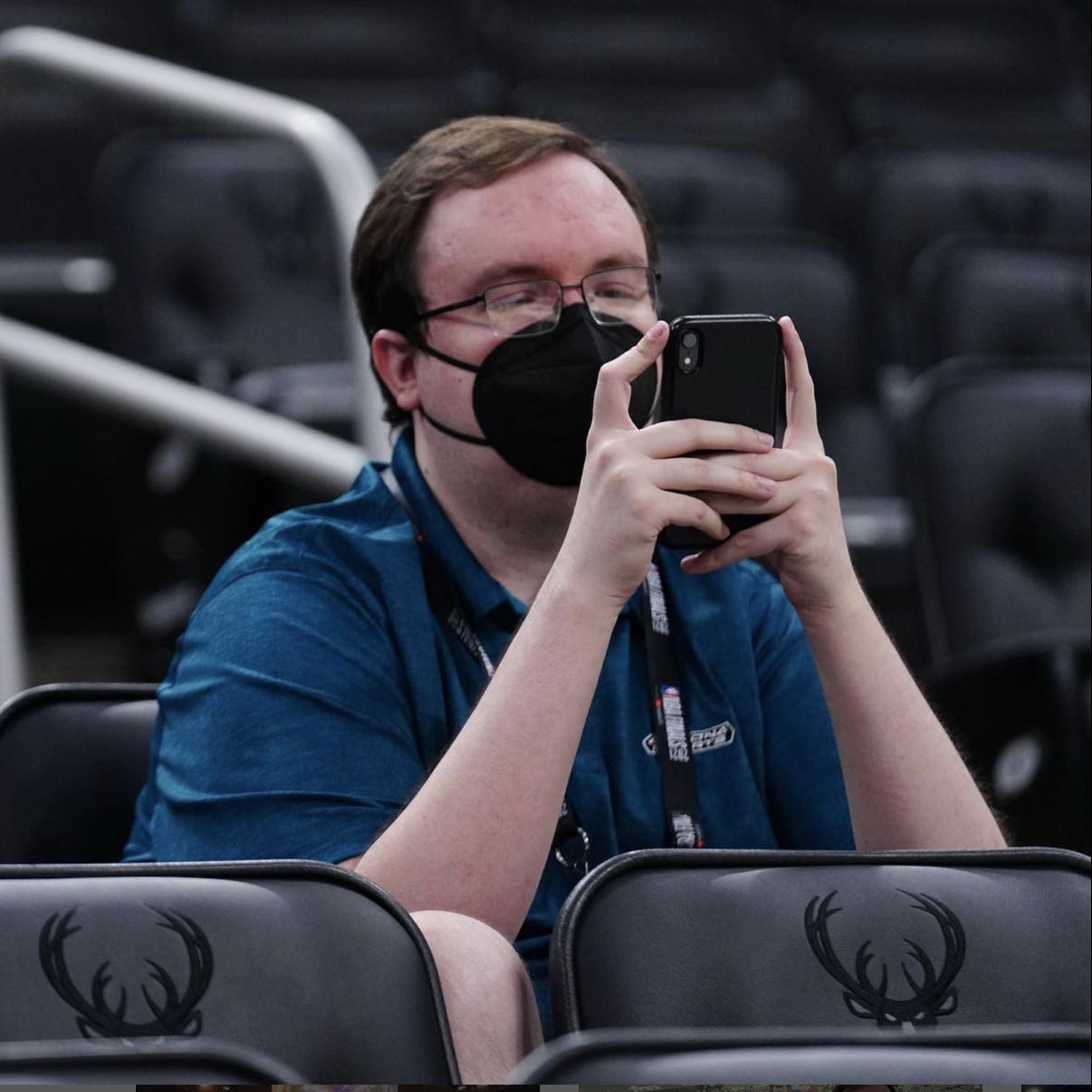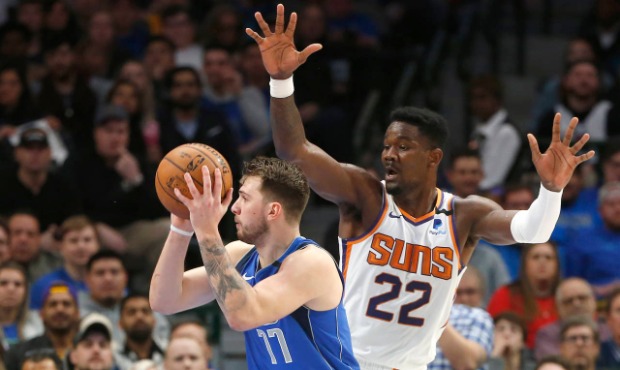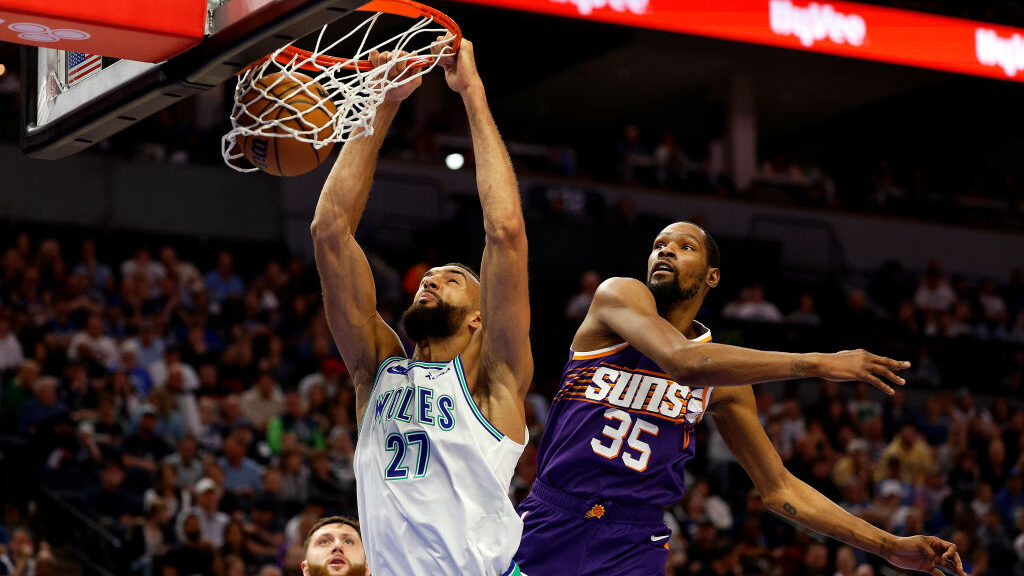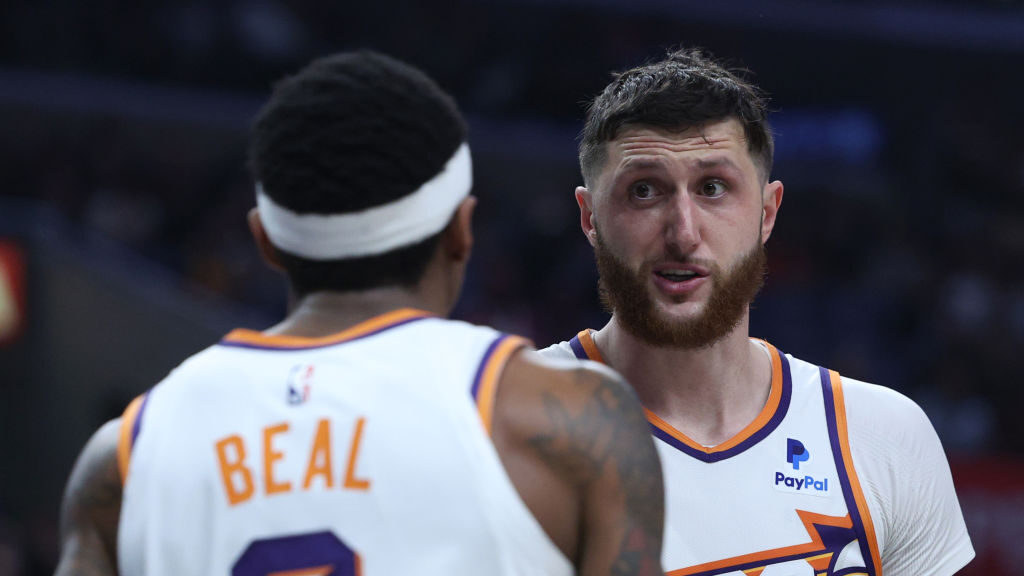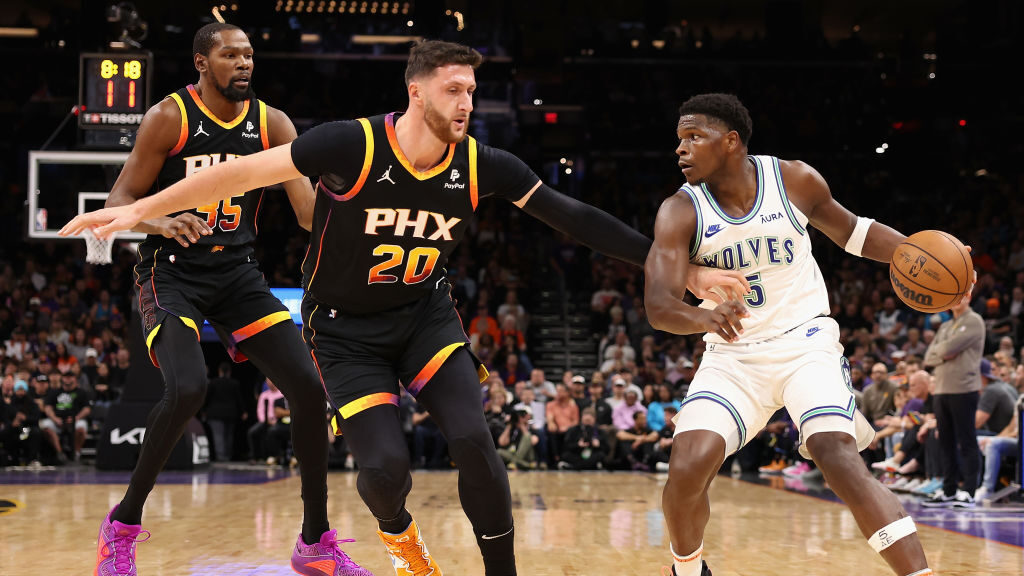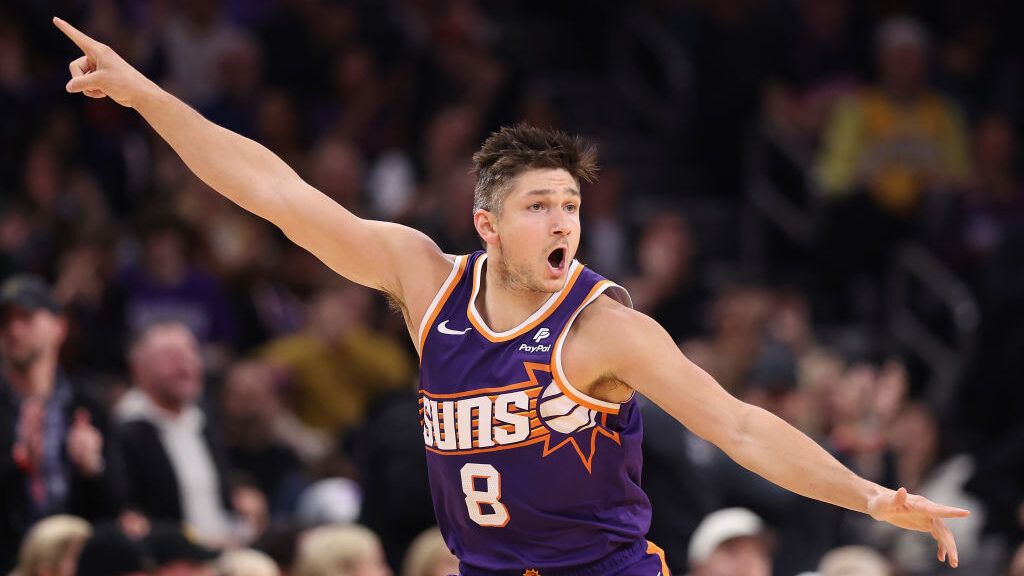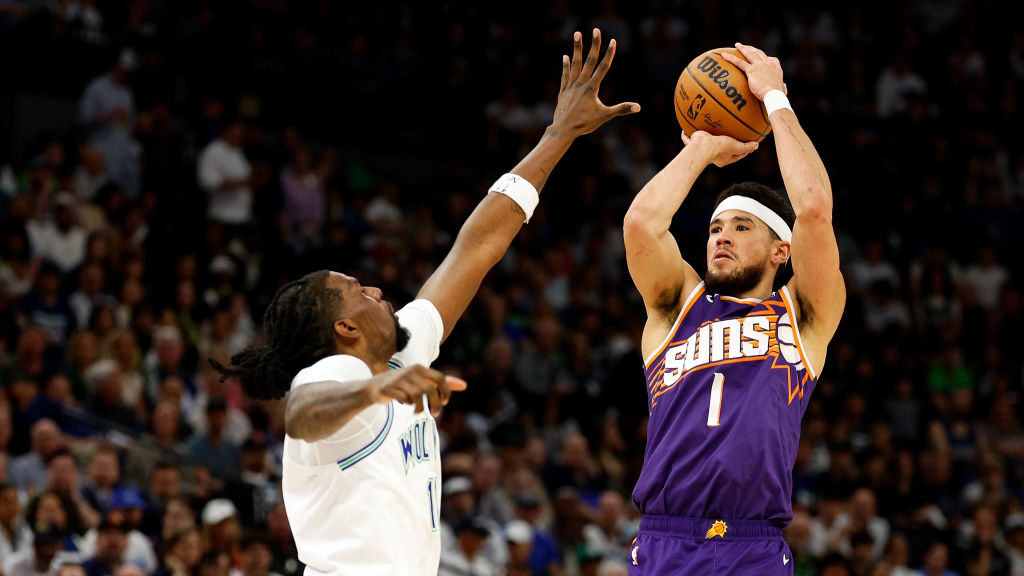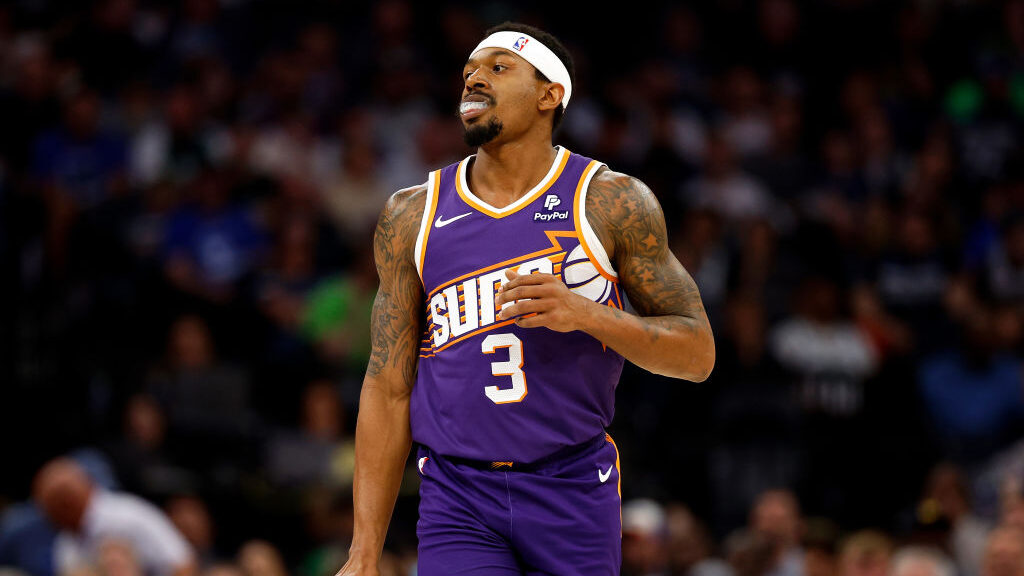Deandre Ayton’s departure would be Phoenix Suns admitting past failure
Jun 2, 2022, 8:47 AM | Updated: 9:22 am
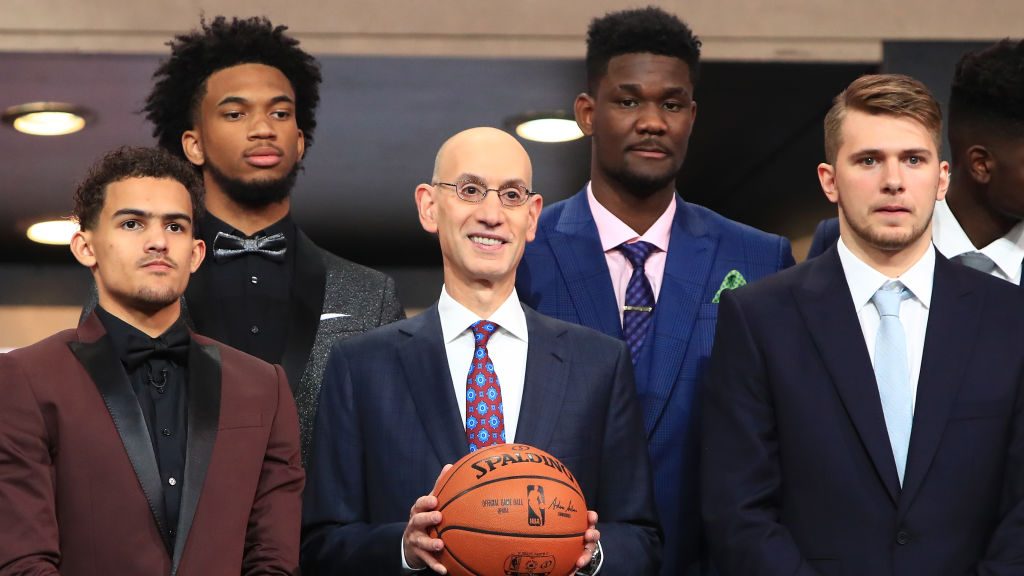
NBA Commissioner Adam Silver (C) poses with NBA Draft Prospects Trae Young, Marvin Bagley III, Deandre Ayton and Luka Doncic before the 2018 NBA Draft at the Barclays Center on June 21, 2018 in the Brooklyn borough of New York City. (Photo by Mike Lawrie/Getty Images)
(Photo by Mike Lawrie/Getty Images)
It has been two-and-a-half weeks since the Phoenix Suns were eliminated from the playoffs.
Since then, the tilt-a-whirl that is offseason speculation began. And because of the nature in which the team was eliminated, it has been a nauseating ride that is going to remind you what you had for lunch.
The heart of it is the evergrowing belief that restricted free agent Deandre Ayton has played his last game with the Suns.
Beyond the why that has been well documented and covered previously is the how.
It’s the same question people have asked me about the squad’s exit every day, from the grocery store to the press box at Chase Field: How did this happen?
How could Ayton potentially join Anthony Bennett, Kwame Brown and Markelle Fultz as the only No. 1 picks since 2001 who did not spend at least their first five seasons with the team that drafted them?
Ayton, the franchise’s lone No. 1 selection, does not deserve to be anywhere close to association with those three. He is a borderline top-five player at his position. He’s great on defense and good on offense with far more potential left to un-tap as a 23-year-old who just reached over 250 games in the regular and postseason.
Why is this even a possibility, let alone what you would bet on happening if you had to pick between him coming back or not?
Well, it all ties back to the decision to select him. Yep, we’re going there, and I’m bringing receipts with me. If that’s not your cup of tea, I wish you a good day and will see you here next time.
Ayton wants the five-year max worth $177 million only the Suns can offer him. I thought he deserved it last year. I still think he deserves it this year. Premium young talent is not cheap. You have to pay the price for it.
One of the central arguments around not giving Ayton a contract that would pay him an average salary over $30 million a season, though, is that it’s too much for a guy who is not individually a core part of the offense.
Now, to be clear, Ayton still is a core part of the offense. It’s just as a screener and diver who sucks in help defenders to open everything and everyone else up.
There are a few reasons why this is the case.
For one, Ayton’s one-on-one offense slows down the principles at the root of what Phoenix does through 0.5, quick-hitting movement on and off the ball that keeps the opposing defense in rotations and makes them pay from different angles.
Secondly, Ayton and his teammates have never had a consistent connection.
Sometimes, the ball-handler would look down low and see Ayton not establishing post position when he should have been. Now they aren’t going to take a peek down there for a few possessions or flat-out look Ayton off.
Sometimes, Ayton is sealing his man and has been for a couple of seconds and either the should-be passer isn’t aware or can’t get him the ball.
Sometimes, the synergy is there, but it’s either a bad pass or Ayton’s lack of proper positioning allowing for the defender to get a swipe at the entry for a turnover.
It never fully linked up. This past season showed a great amount of progress, but again, it came with peaks and valleys.
He has never been an elite, reliable go-to scorer in the post with a diverse arsenal, either.
This year, Ayton’s touch on his hook shot reached a very high level. And in short roll situations, he developed a floater that is money. Those two things were huge steps forward and continued the trend of him improving considerably each season.
Beyond that, however, there isn’t a ton. Ayton’s lack of consistent aggression as a ball-handler has held him back. He should always be able to punish an opposing defense by turning a catch 18 feet away from the rim into a six-foot hook shot with the snap of a finger.
We’ve had plenty of glimpses of the good and bad in this process, but there hasn’t been nearly enough consistency in order for him to be an occasional hub of the offense, and that’s a shame given the physical gifts of his footwork and strength.
In a way to illustrate this was absolutely a valid concern back in the summer of 2018, Ayton’s lack of a versatile offensive game is the first reason why I wrote back then he wasn’t the No. 1 guy.
Included in there is concern about his short midrange game, the area he excelled this year, but his ball-handling and face-up game had a long way to go, too.
There was also his lack of physicality mentioned in there. Ayton was not putting dudes from the University of Maryland, Baltimore County in the basket before he dunked it on their noggin, so there was natural skepticism about if he could do it in the pros.
It has been tolerated in Phoenix. He doesn’t throw it down too often and it’s OK for how his game works.
But the absence of a mentality there is why you have baffling sequences like this one where it even messes up his finesse game.
To go back to the word “tolerated,” it has now been four years. That’s long enough to put in concrete that this is just who Ayton can be in spurts until he consistently proves otherwise.
I’ve been intentionally overusing “consistent” for this portion because we’ve seen Ayton overcome this before. A month ago, he was coming off a phenomenal first-round performance against the New Orleans Pelicans, stepping up offensively while Devin Booker healed up.
After dominating against a supersized frontcourt that required force, it was gonzo versus the Dallas Mavericks’ tiny frontcourt.
The detached way in which Ayton is unengaged loops back to pre-draft concerns about his defense, where he looked lost and did a tremendous job getting better in his first three years to become one of the best defensive bigs in basketball. But that lack of direct, decisive and connected play still rears its head on both ends.
I wrapped that pre-draft piece by evaluating Ayton’s possible skillset and if that makes him a truly elite center, a.k.a. what was rightfully expected of him when he was picked first overall.
I was wrong with what that skillset could be. His biggest strength is defense and then his touch around the rim forces opposing defenses to over-help in his direction, which is predicated on him playing like his hair is on fire like he did in the 2021 postseason.
That is how Ayton influences games the most. It’s not through gargantuan rebounding numbers, a dynamic offensive game or a more well-balanced one that extends to the 3-point line so an offense can have proper spacing. Maybe that comes in a few years but it’s difficult to see it in the forecast.
This relates to the notion that Phoenix is hesitant to pay a center max money in the first place.
The irony in that is the Suns signed themselves up for doing exactly that the second Adam Silver enunciated the first syllable of “Deandre” on that 2018 NBA Draft stage.
It was their failed bet on him becoming one of the few 5s in basketball that is worth that much money. You only need one hand to count with to get to all of those centers. If the Suns believed Ayton was that, he would have gotten his bag last fall. He did not.
But remember, it was not this group of decision-makers that sealed their fate. This was former general manager Ryan McDonough’s pick. Er, I mean, believed to be his pick.
Just so you are fully educated @tomhaberstroh https://t.co/itW4HqzMee https://t.co/jOUNUGDlK5
— Ryan McDonough (@McDNBA) May 16, 2022
Current general manager James Jones and head coach Monty Williams were a year out in their respective roles. They ushered in a new era of Suns basketball that completely transformed the organization’s basketball operations into one of the best.
The wonder with that going back to the time of their appointments was if Ayton was going to be a part of it for the long term. It doesn’t seem like it.
Everything came full circle because it was the player they should have taken who potentially sealed the end of Ayton’s Suns tenure.

